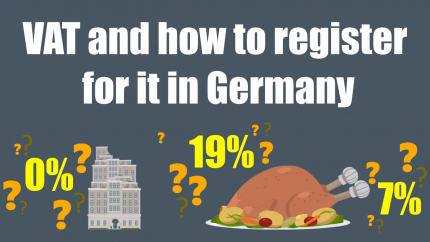International VAT and expert opinions on VAT
Imagine the following: You are an American entrepreneur who would like to establish a subsidiary for sales in Germany. The American parent company is to invoice the German subsidiary for the goods, which in turn is to resell them to its customers in Germany and other European countries. However, the goods are not manufactured in the USA, but in China and delivered directly from the Chinese plant to the end customers in Germany, Italy or Norway. What does this mean in terms of VAT for the German subsidiary? And what should the invoices look like?
Do you supply customers abroad with your German company? Do you provide services for customers abroad? Or is your company just starting up and you are planning to serve customers abroad? If you are already active across borders, you certainly know how complicated the international sales tax / GST / VAT law is and how many regulations there are to be observed.

International VAT and expert opinions on VAT

Please accept YouTube cookies to play this video. By accepting you will be accessing content from YouTube, a service provided by an external third party.
If you accept this notice, your choice will be saved and the page will refresh.
VAT registration in Germany, esp. when selling via internet marketplaces
Foreign corporations and entrepreneurs delivering goods to Germany or providing services in Germany are generally obliged to register in Germany, at least for VAT purposes. Since 1 January 2019 there is an option for an exemption from the duty to register for B2C services (electronically supplied services, telecommunications, radio or television broadcasting to private, non-entrepreneurial EU customers) if a threshold of 10,000 € turnover is not exceeded.
Since operators of internet marketplaces such as Amazon and Ebay became liable for VAT of their traders, they must follow a certain procedure which also has an effect on their foreign traders. Every professional trader has to apply for a certificate that proves that he is a VAT registered business in Germany. The trader must send a copy of this certificate to the operator of the marketplace. Furthermore, traders from outside the EU also have to name a German resident (e.g. a German tax advisor) who is authorized to receive any mail from the tax authorities.
Traders form outside the EU (European Union) must get a German tax number and certificate of the tax number and present the certificate to the marketplace operator that they use for their online business since 1 March 2019. For traders from other EU countries this rule applies starting 1 October 2019. To avoid any liability risks, marketplace operators may shut out traders until they present the certificate. It may take a few weeks to get a tax number in Germany, so act well beforehand you want to start selling in Germany via internet marketplaces.
Our services for foreign traders include:
- VAT registration in order to obtain the certificate
- Act as authorized person to receive any mail from the German tax authorities
- Submit regular VAT declarations to the German tax office
- Give ongoing advice on VAT questions (see below) or prepare VAT expert opinions (see below) on how your company must comply with VAT in Germany
Be the contact partner in case of VAT audits of the German tax authorities.
Ongoing VAT advice in international business transactions – many pitfalls lurk
VAT law is complex and subject to constant change. Particularly if you have to write invoices to companies abroad or goods are delivered to a location abroad, caution is advised. If you receive invoices from abroad, you should check whether they meet the requirements for input tax deduction. If you pay the invoice and the tax office later complains about the VAT treatment, you may be left sitting on the damage. We therefore recommend that you have your invoices checked by an expert before paying. If errors are noticed, you can refuse to pay the invoice until you have received a proper invoice. We have summarised some of the most common VAT errors for you here.
Therefore, do not wait until the tax consultant prepares the annual financial statements and checks the plausibility of some business transactions for VAT, but contact us immediately and during the year if you are unsure about the VAT treatment.
However, if you are setting up a company or changing your business strategy, it is a good idea to have the following comprehensive VAT check carried out by an expert.
Fundamental review of VAT regulations in case of incorporation or major changes
What is a VAT expert opinion?
We will provide you with a practical guideline in the form of a VAT expert opinionprepared by us. You do not receive a long dry theoretical text, but a guideline for your employees in their daily work. This gives you and your employees the security of knowing which VAT consequences are to be drawn in Germany when doing business with your customers.
You explain to us
– Your business model,
– the respective transport routes and transport conditions
– and the way of invoicing with several companies involved.
We check for you what consequences arise in each case with regard to turnover tax. The basic constellation could look as follows:
– Business model: Distribution of microelectronic products on the European market. The products are manufactured by the parent company and resold to the German subsidiary.
– Transport route: the goods are delivered by the parent company in Israel to a central warehouse in Germany. From this warehouse, customers in Germany, other EU countries and non-EU countries are supplied.
– Invoicing method: the parent company issues an invoice to the German subsidiary, which in turn issues an invoice to the end customer.
Should we find out that your company is subject to VAT in other countries, we will try to find a competent local consultant for you. If you wish, we will take care of the complete communication with him, so that you do not have to take care of the formalities yourself.
What does such an expert opinion look like?
Our expert opinion represents the correct VAT treatment for the various cases (domestic deliveries, deliveries to EU countries and to so-called third countries). We distinguish between transactions with entrepreneurs and transactions with non-entrepreneurs. In addition, we prepare checklists for you on how the outgoing invoice should look in each case.
In this way, you know at a glance what requirements an invoice has for an entrepreneur in France, for example. In this case, the VAT ID number of the customer would have to be stated on the invoice. If you want to avoid liability, you must regularly check with the tax authorities whether the number is still correct.
In addition, we will explain any documentation requirements separately for each case. For a delivery to France, for example, you must provide proof of receipt that the delivery has actually been made to the customer in France.
Finally, we will explain to you when VAT is incurred in Germany and when it has to be paid to the tax office.
Why is it worthwhile to ask for a VAT report?
Especially in the case of VAT, more mistakes happen than is generally assumed. How quickly do you overlook the fact that no VAT has to be shown on an outgoing invoice? Or one forgets one of the formalities such as the VAT identification number of the receiving company in an EU country. As soon as you deliver abroad, other rules may have to be observed. With a VAT report from us, the employee who creates your invoices has a secure guideline in his hands. The error rate drops considerably. In addition, you have a clear, permanent guide that new employees can also use without training in invoicing. And you don’t have to have the VAT treatment checked again for every outgoing invoice if you have any doubts. This saves costs and provides legal certainty.
Of course, we will be happy to extend existing reports if the business processes in your company change or you want to serve new markets. We will keep you up to date on the latest changes in VAT law that are relevant to you. If the changes in tax law are too extensive, we will be happy to update the VAT report for you. You will receive a follow-up report at a reduced price within 3 years of the last report being prepared.
